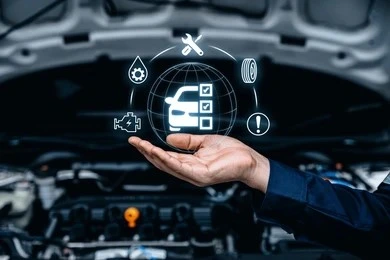Learn simple yet effective ways to increase your car’s resale value before selling.
Introduction
Selling a car can be a lengthy process, especially when buyers are skeptical about the vehicle's condition. They want peace of mind knowing that the car they’re purchasing is free of hidden issues. As a seller, providing potential buyers with a pre-sale inspection report can help alleviate concerns, streamline the sales process, and even fetch a higher price for your vehicle.
A pre-sale inspection offers both you and the buyer valuable insights into the car’s condition, building trust and setting clear expectations. In this blog, we’ll explore why a pre-sale inspection is a smart move and how it can accelerate the sale of your car.
What Is a Pre-Sale Inspection?
A pre-sale inspection is a comprehensive examination of your vehicle conducted by a professional mechanic before you list it for sale. The goal is to identify any existing issues, assess the car's overall condition, and ensure it is roadworthy and in good shape. After the inspection, you'll receive a detailed report that outlines the findings, which you can share with potential buyers.
This report acts as a transparent document that can address any questions or concerns that buyers may have, making them more comfortable with the purchase.
Why a Pre-Sale Inspection is Important
Builds Trust with Buyers
One of the most common concerns buyers have when purchasing a used car is whether the vehicle
has hidden issues that could lead to expensive repairs down the road. By providing a pre-sale
inspection report, you’re offering transparency about the car’s condition, which builds trust
and reassures buyers that they won’t be facing unexpected issues. This transparency can make
your car more attractive compared to others on the market that don’t offer such reports.
Increases the Vehicle's Marketability
A car with a pre-sale inspection report stands out in a crowded market. It shows potential
buyers that you’re committed to honesty and that the vehicle has been properly maintained.
Buyers are more likely to choose a car that comes with a detailed inspection, as it offers them
a clear understanding of what they’re purchasing. This can lead to faster sales and potentially
higher offers.
Highlights Any Issues Early
A pre-sale inspection allows you to address any mechanical or cosmetic issues before listing the
car. If the mechanic identifies minor issues, you can choose to repair them before showing the
car to buyers. Taking care of these issues upfront can help you avoid dealing with price
haggling later on, as buyers may try to factor in the cost of repairs when making an offer.
Prevents Delays in the Sale Process
Without a pre-sale inspection, buyers might request their own inspection once they’ve shown
interest in your car. If any issues are found, the sale process can be delayed or even fall
through entirely. By getting the inspection done ahead of time, you prevent this scenario from
happening. Buyers who are already comfortable with the car’s condition are more likely to
proceed quickly with the transaction.
How a Pre-Sale Inspection Helps with Pricing
Justifies Your Asking Price
A pre-sale inspection report provides a detailed assessment of the vehicle's condition, helping
you justify your asking price. If your car is in excellent condition with all systems
functioning well, the inspection report will confirm that, supporting your decision to price it
higher. On the other hand, if there are minor issues, you can adjust the price accordingly,
ensuring that both you and the buyer are satisfied with the final amount.
Avoids Underpricing
Without an inspection, it can be tempting to lower your price quickly to sell the car,
especially if you’re in a rush. However, a pre-sale inspection can help you avoid this. By
knowing the car’s true value based on its current condition, you can price it more accurately
and prevent the risk of undervaluing it.
Helps With Negotiations
A pre-sale inspection can also help you during negotiations. If a buyer tries to haggle the
price down based on the car’s condition, you can refer to the inspection report to show that the
vehicle is in good shape. This can give you an advantage in negotiations and help you hold firm
on your asking price.
What to Expect During a Pre-Sale Inspection
A thorough pre-sale inspection typically includes a range of checks that cover the car’s key systems and components. Here’s a breakdown of what to expect:
Exterior Inspection
- Body condition: The mechanic will check for any dents, scratches, or rust spots that could affect the car’s appearance or resale value.
- Tires: Tire tread depth and overall condition will be assessed to determine if they need replacing soon.
- Lights and mirrors: All exterior lights (headlights, brake lights, turn signals) and mirrors will be inspected for damage or functionality issues.
Interior Inspection
- Seats and upholstery: Any rips, stains, or wear on the seats and interior will be noted.
- Dashboard and controls: The mechanic will ensure that all gauges, buttons, and controls are working properly.
- Climate control: Air conditioning and heating systems will be checked to ensure they’re functioning.
Mechanical and Electrical Systems
- Engine and transmission: The mechanic will assess the engine's condition, including oil levels, and check for leaks or signs of wear. The transmission’s performance will also be evaluated.
- Brakes: Brake pads, rotors, and fluid levels will be checked to ensure the braking system is safe and effective.
- Suspension: The suspension system, including shocks and struts, will be inspected for wear and functionality.
Fluid Levels and Belts
- Fluids: Oil, coolant, brake fluid, power steering fluid, and transmission fluid levels will be checked.
- Belts and hoses: The condition of the belts and hoses will be examined to ensure they’re not worn or cracked.
Test Drive
The mechanic will often take the car for a short test drive to assess its overall performance, checking for any strange noises, vibrations, or issues with handling.
Choosing the Right Mechanic for a Pre-Sale Inspection
Choosing a reputable mechanic to perform the pre-sale inspection is crucial. Look for a mechanic who is experienced, well-reviewed, and has no vested interest in buying the car. Many dealerships also offer pre-sale inspection services, which can be a convenient option.
Be sure to ask the mechanic to provide a detailed report of their findings, which you can then share with potential buyers. If any issues are identified, make sure to get estimates for repairs, so you can decide whether to fix them or adjust your price accordingly.
How a Pre-Sale Inspection Can Speed Up the Selling Process
Attracts Serious Buyers: Serious buyers will appreciate the transparency that comes with a pre-sale inspection. It shows that you’ve taken the time to ensure the car is in good condition, making it more likely that they’ll proceed with the purchase without delays.
Reduces Negotiations: Because buyers already know the car’s condition, there is less room for haggling based on perceived problems. If your car is in good condition, the inspection report will make it clear that the price is fair, reducing the back-and-forth negotiations.
Speeds Up the Transaction: With fewer questions and concerns, the buyer is more likely to complete the transaction quickly. This can be particularly beneficial if you’re looking to sell quickly or need the money for another purchase.
Conclusion
Selling a car can be a complicated process, but a pre-sale inspection can make a world of difference in accelerating the sale. By providing buyers with a comprehensive report of the car’s condition, you build trust, justify your asking price, and reduce the risk of delays or cancellations.
Not only does a pre-sale inspection help you sell your car faster, but it also ensures that you’re pricing the car correctly, addressing any issues before they become problems, and making the sale process more efficient and transparent.
Whether you’re selling privately or through a dealership, investing in a pre-sale inspection is a smart way to increase the likelihood of a smooth, successful sale.
Key Takeaways
- A pre-sale inspection builds trust with buyers and increases marketability.
- It can help you set a fair price and avoid underpricing or overpricing your car.
- The inspection report acts as a valuable tool during negotiations, providing transparency and clarity.
- A pre-sale inspection can speed up the selling process and attract serious buyers.
With the right approach, a pre-sale inspection can be the key to accelerating your car sale and getting the best value for your vehicle.




Share this post: